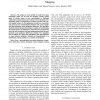Free Online Productivity Tools
i2Speak
i2Symbol
i2OCR
iTex2Img
iWeb2Print
iWeb2Shot
i2Type
iPdf2Split
iPdf2Merge
i2Bopomofo
i2Arabic
i2Style
i2Image
i2PDF
iLatex2Rtf
Sci2ools
108
click to vote
ICRA
2009
IEEE
2009
IEEE
Multi-robot plan adaptation by constrained minimal distortion feature mapping
We propose a novel method for multi-robot plan adaptation which can be used for adapting existing spatial plans of robotic teams to new environments or imitating collaborative spatial teamwork of robots in novel situations. The algorithm selects correspondences between previous and current spatial features by the application of pairwise constraints, and generates the transformation function with a fast regular grid approximation which minimizes distortion. The algorithm requires minimal domain knowledge, is capable of transforming the spatial aspects of collaborative team behavior and performs better in noisy problems with large displacements than the most generally used quadratic differences method. The algorithm can be utilized for rapid plan adaptation, plan generalization or team behavior imitation. Methods are demonstrated on a multi-robot control problem in a random environment.
| Added | 19 Feb 2011 |
| Updated | 19 Feb 2011 |
| Type | Journal |
| Year | 2009 |
| Where | ICRA |
| Authors | Bálint Takács, Yiannis Demiris |
Comments (0)

